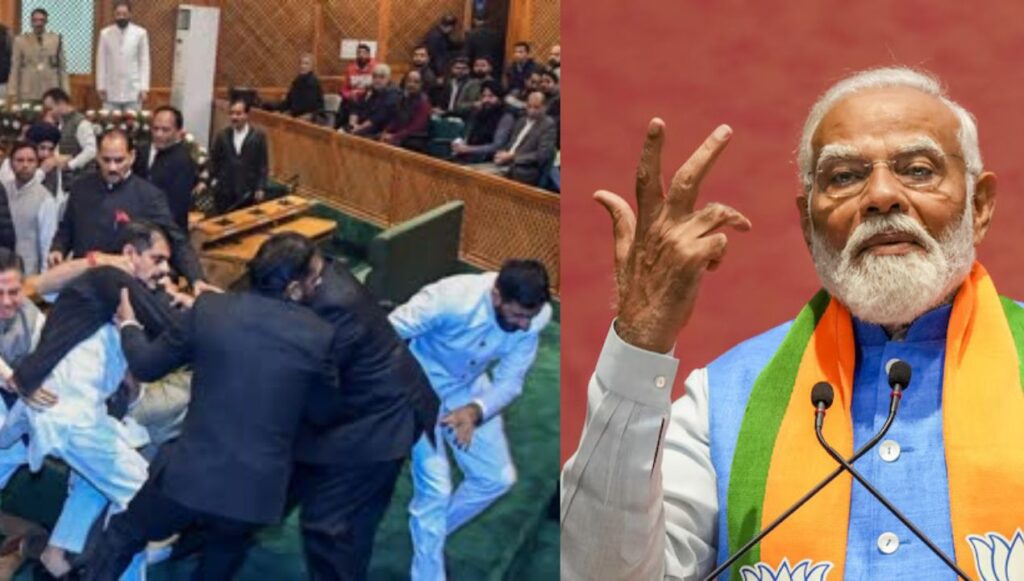The Jammu & Kashmir Assembly recently passed a resolution calling for the restoration of Article 370, reigniting one of India’s most contentious debates. The resolution, approved by voice vote, has sparked intense political reactions nationwide, with PM Narendra Modi sharply criticizing the Congress-National Conference coalition for backing the resolution. Here’s an in-depth look at the events unfolding in the Assembly and the reactions from key political leaders.

- Resolution Passed Amid Opposition from BJP
- PM Modi Slams Congress and National Conference Over Article 370 Resolution
- “Article 370 Cannot Be Restored”: PM Modi’s Reaffirmation
- National Conference Pushes for Statehood and Autonomy
- BJP’s Staunch Opposition and Widespread Protests
- A Broader Conflict of Ideologies and Visions for Jammu and Kashmir
Resolution Passed Amid Opposition from BJP
On Wednesday, the Jammu & Kashmir Assembly passed a resolution calling for the restoration of Article 370, which previously granted the region special autonomy before its revocation in 2019. The resolution was approved by a voice vote, despite strong opposition from BJP members. Following the resolution’s passage, BJP MLAs staged vigorous protests, expressing discontent with what they view as a move against the integrity of the Union Territory.
According to reports, BJP MLAs who stood firmly against the resolution were forcefully removed from the Assembly by order of the Speaker. The heated protests have continued for three days, creating a highly charged atmosphere within the legislative halls.
PM Modi Slams Congress and National Conference Over Article 370 Resolution
Reacting to the developments in Jammu & Kashmir, Prime Minister Narendra Modi, speaking from Dhule, Maharashtra, strongly condemned the Congress and National Conference alliance for supporting the resolution. He alleged that their stance was part of a larger conspiracy against the Union Territory of Jammu & Kashmir.
“The Congress and the INDI alliance began plotting against Kashmir as soon as they saw an opportunity to govern in the region,” PM Modi remarked. He went on to say that the country would reject this resolution, highlighting that the BJP would stand against any attempt to undo the abrogation of Article 370.
“Article 370 Cannot Be Restored”: PM Modi’s Reaffirmation
During his speech, PM Modi reassured the public that Article 370 would not be restored under any circumstances. He declared that the Constitution of Dr. B.R. Ambedkar would remain in force in Jammu & Kashmir, and no power could overturn this change. “By abrogating Article 370, I implemented the Constitution of Dr. Ambedkar in Kashmir.
This was my biggest tribute to Babasaheb Ambedkar,” the Prime Minister said, reiterating his commitment to maintaining equal rights for all citizens within the Union Territory.
National Conference Pushes for Statehood and Autonomy
Adding another dimension to the political debate, National Conference leader Omar Abdullah addressed the Assembly on the issue. He described the passage of the resolution as a significant moment for the people of Jammu & Kashmir, who, he said, had finally regained their voice in the legislative process.
“We are requesting statehood and the right to live with dignity,” Omar Abdullah stated. “We ought to have rights over our lands and jobs, but let others come and invest. We’ll protect our assets and defend our rights,” he continued, emphasizing that statehood would be a step toward economic and social empowerment for the people of Jammu and Kashmir.
BJP’s Staunch Opposition and Widespread Protests
The special status resolution has fueled ongoing protests by BJP members, who argue that granting special status would undermine national unity and disrupt the progress made since Article 370’s abrogation. For three consecutive days, BJP legislators have voiced strong objections, leading the Assembly Speaker to call out 12 opposition MLAs and Langate lawmaker Sheikh Khurshid to restore order.
“Will this be accepted by the nation?” PM Modi questioned, adding that the Congress’s actions reflected a conspiracy against the values enshrined in the Constitution.
A Broader Conflict of Ideologies and Visions for Jammu and Kashmir
At the core of this heated debate lies a broader ideological conflict. While the Congress-National Conference coalition advocates for statehood and autonomy for Jammu & Kashmir, the BJP insists that Article 370’s abrogation was essential for the region’s development and integration with the rest of India. The BJP has positioned itself as a defender of Dr. Ambedkar’s Constitution, whereas Congress and its allies seek a return to the region’s former special status.
As political tempers rise, this controversy is likely to have long-term implications for Jammu & Kashmir’s future governance. Public sentiment within the region appears divided, with supporters of Article 370 restoration championing greater autonomy and opponents advocating for a unified India under one Constitution.
The Jammu & Kashmir Assembly’s recent resolution has reignited a highly sensitive issue, drawing sharp political divides within the Assembly and beyond. As Prime Minister Modi’s comments make clear, the BJP remains resolute in its opposition, warning of national consequences if the resolution were to gain broader acceptance.
Meanwhile, Omar Abdullah and the National Conference remain steadfast in their calls for statehood and self-governance. This debate has put Jammu & Kashmir at the center of India’s political discourse once again, setting the stage for further developments as political leaders and citizens alike await the next steps in this ongoing saga.
Stay connected with Trending Global News for the latest updates on this and other breaking stories.
